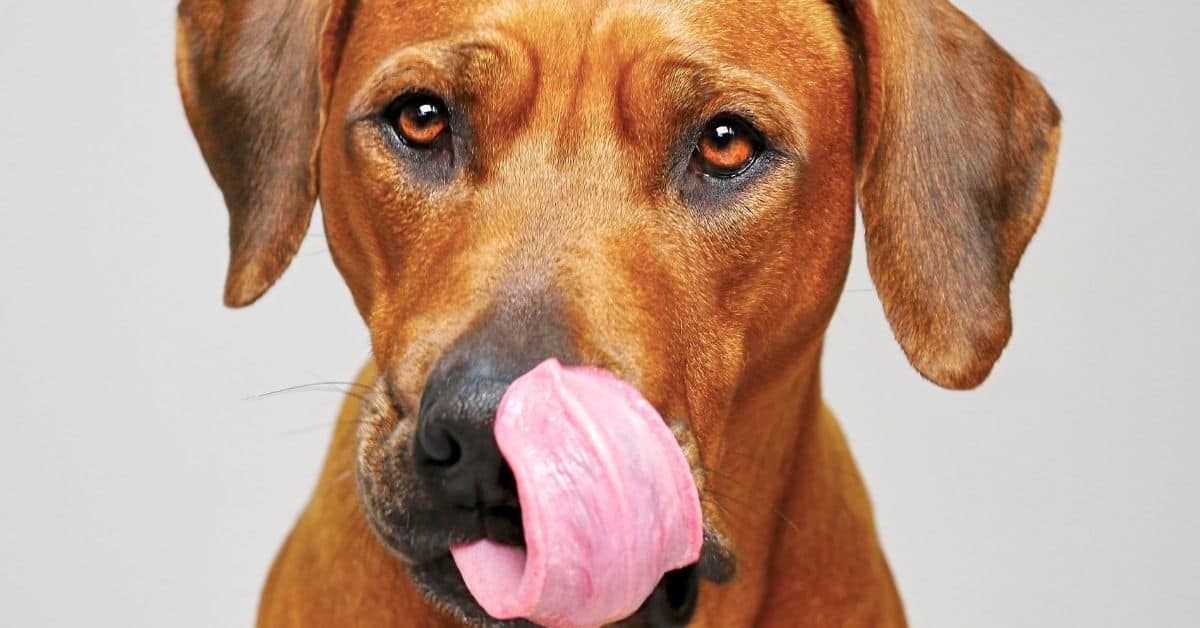Our dogs have many normal behaviors; snoring, yelling at the delivery guy, taking naps in odd places—the list goes on.
Your dog is probably accustomed to licking various body parts, objects in their environment, other pets, your leg, or even the air.
Dog licking his lips does not pose a severe threat in and of itself; however, excessive lip licking typically indicates something wrong and can happen frequently or without stopping.
The answer to why my dog keeps licking his lips is simple and free from stress.
A dog will typically lick his lips when they feel dry, when something gets stuck in his mouth, or when he is about to eat and is hungry.
Dogs have salivation glands that activate before a meal, which is why your dog will lick his lips when hungry.
Your dog’s excessive licking in response to excessive saliva; in some cases, this happens even in the absence of food.
Sometimes all it takes to get the dog drooling and licking his lips is shaking a bag of food or cracking open a can.
As you know now the answer to the question “why does my dog keep licking his lips”, continue reading to get more information.
There are numerous situations where lip-licking might be less typical and more cause for concern.
Dog constantly licking his lips for many common reasons, as you’ll discover below.
12 Reasons Why Dogs Lick Their Lips
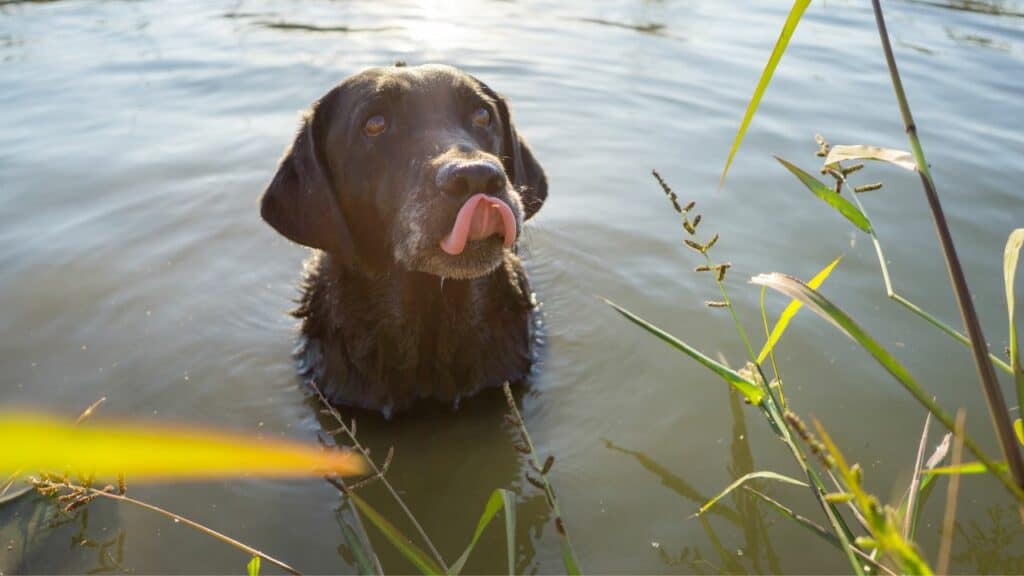
Dogs tend to start licking their lips constantly due to following reasons:
1. Behavioral Motives
Some dogs may constantly lick their lips and swallow to convey a range of feelings.
For instance, if your pet is confused about some aspects of the training session, he may lick his lips to show it.
Additionally, if your dog is yawning and licking his lips repeatedly, it may be a symptom of frustration brought on by the intense training.
When a dog needs to calm down, it will lick its lips excessively.
Dogs frequently use this conciliatory gesture when terrified or under pressure.
If stress is the primary driver of these actions, you must identify and address the discomfort causing it.
Typically, it might be one of the following:
Loud noises that include internal or external noises
Guests or strangers present in your house
The arrival of a new pet or animal in his territory
A new territory or some transformations in the place after renovations
2. Anxiety Or Fear
Dogs will lick their lips excessively when they feel threatened or anxious.
According to different studies, dogs will lick their lips when they see aggressive behavior from other dogs.
As a result, the aggressive dog’s behavior would reduce.
When they are scared or uneasy, dogs will also lick their lips at humans in the hopes that the person won’t lash out at them.
When you pet a dog, they may also lick their lips to show that they are anxious or stressed out by the interaction.
In addition to avoiding eye contact, adopting a tense posture, crouching, pinning the ears, and tucking the tail, other dog body language indicators of fear, anxiety, and stress include these.
It’s better to cease the action, give the dog some room, turn your back on him, and wait for him to approach you if you notice any of these body language indicators in a dog.
Chronic pet behavior like lip licking can also develop due to ongoing anxiety.
The dog may offer an appeasement gesture by licking his lips and averting his gaze.
You can also recognize your dog is in anxiety or fear if he is panting and restless.
Giving your dog enough exercise, exciting toys, ignoring nervous behaviors, and rewarding calm behaviors can help lessen separation anxiety and fear.
Your dog’s anxiety can be diagnosed by your veterinarian, who may recommend anxiety drugs if the condition is severe.
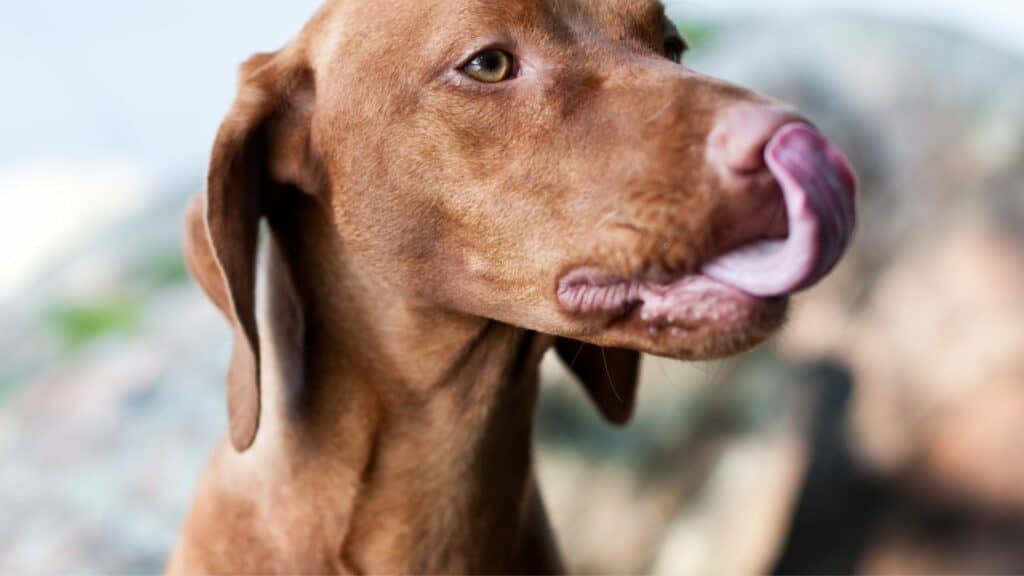
3. Nervousness
Some dogs may lick their lips frequently in response to being anxious about something or someone.
Although not very common because anxious dogs often tuck their tails, look away, or become aggressive.
We think that is the problem if your dog is licking their lips and is nervous.
4. Obsessive-Compulsive Syndrome
Yes, like people, dogs can acquire obsessive-compulsive disorder (OCD), and excessive lip licking behavior may be a symptom.
OCD habits often start to manifest at or just before adolescence.
Dogs with OCD frequently refuse and continue to do so even when their owners are not there.
If you suspect your dog has OCD, you should immediately take him to the vet for an evaluation.
The physician may then recommend a veterinary behaviorist because OCD can be challenging to cure.
5. Dehydration
Your dog may lose water in warmer weather if he keeps licking his lips and panting.
To know if your dog may be dehydrated, you need to know how long a dog can go without water.
But please, don’t wait the maximum hours until you give your dog something to drink.
In hot weather, dogs with a history of liver or kidney disease are also more susceptible to overheating.
If that is the case, it is pretty obvious.
Keep an eye out for further signs, such as:
Dull, sticky gums appear and spread quickly
Your dog keeps licking her lips and panting
There’s no or very little skin elasticity
Sunken eyes
Lethargic symptoms
6. Discomfort In The Mouth
Dog licking lips can be because of pain in the dog’s mouth or oral discomfort.
In this situation, you should examine the animal for foreign oral objects, periodontal disease, swelling salivary glands, and a dog teeth problem.
Since your dog’s salivary glands lie under its jawline or tongue, you can check them by looking for streaming.
If you observe swelling in these regions, the tissues around have become encrusted with sialocele, a fluid prevalent in cystic cavities.
Take your pet to the vet for a checkup if you think it might be experiencing oral discomfort.
Even though you can visually check the pet’s tongue and gums on your own, you won’t be able to see the larynx, necessitating veterinary help.
In addition, your vet may need to sedate your dog to look at its soft palate.
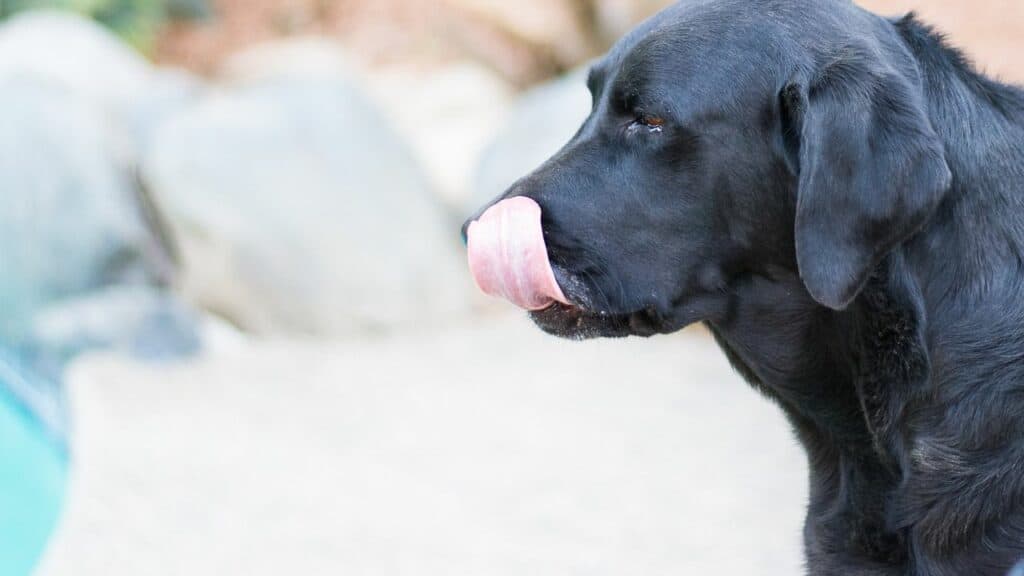
7. Dental Issue
Dog owners must brush their teeth daily just like they do for themselves.
Make sure to take your dogs for dental examinations as directed by the vet if they need fillings after breaking teeth.
Otherwise, your dog will experience dental decay from a lack of proper care.
Other signs of dental problems and poor dental hygiene in dogs can result in oral dog mouth ulcers.
For instance, plaque may harden into tartar, the perfect environment for bacteria to grow and cause ulcers.
This dental disease makes things worse by causing pain and excessive drooling.
Your dog never stops swallowing and licking his lips.
There is a way to determine if the lick-and-swallow behavior is driven by dental disease.
You can check whether your dog has an unpleasant odor from his mouth, irritation, or food fragments lodged between infected teeth.
8. Injury
Additionally, your dog might lick his lips as a result of trauma.
Dogs may sustain injuries in a variety of ways.
They could be wounded by children who don’t know how to act around dogs, hit by cars, get into fights with other animals (like the neighbor’s cat), and more.
If your dog injures his mouth or accidentally cuts or pierces his lip, it will probably lick his lips to try to ease the discomfort.
Injuries and wounds in the mouth can be problematic and should never be ignored because it’s so simple to spread infection there.
9. Illness
Lip licking may occasionally signify another underlying medical problem, such as dog sickness.
Before beginning to vomit, your dog may lick his lips and salivate if he is experiencing nausea.
Your dog may be caught eating grass as well.
Likely, your dog’s symptoms of vomiting, chewing grass, and lip-licking are connected.
Visit your vet if the symptoms worsen or don’t go away in 24 hours.
Always err on the side of caution and avoid potential dehydration.
10. Bloat
Bloating is another underlying health problem that can cause lip licking in dogs.
Unexpectedly, a bloated stomach can also cause your dog to lick its mouth constantly.
A dog’s stomach may grow from food, liquid, or gas.
Deep-chested dog breeds are more likely to suffer from this medical issue.
If your dog begins to pace tensely and retch, you should get him to the clinic right away since bloating can be dangerous or even fatal to dogs.
11. Seizures
Dogs can occasionally get partial seizures.
While still alert and responsive, a dog experiencing a partial seizure may lick the air and repeatedly snap for a while.
After an event like this, your dog will likely experience a seizure if they appear unhappy and listless.
12. Cognitive Dysfunction In Dogs
Dogs with Canine Cognitive Dysfunction Syndrome (CDS), a condition related to dementia in humans, may lick their lips.
It happens in aged and senior dogs and is a diagnostic of exclusion, meaning your veterinarian will identify this ailment only when other reasons for lip licking are excluded.
When To Be Concerned About Your Dog Licking Their Lips
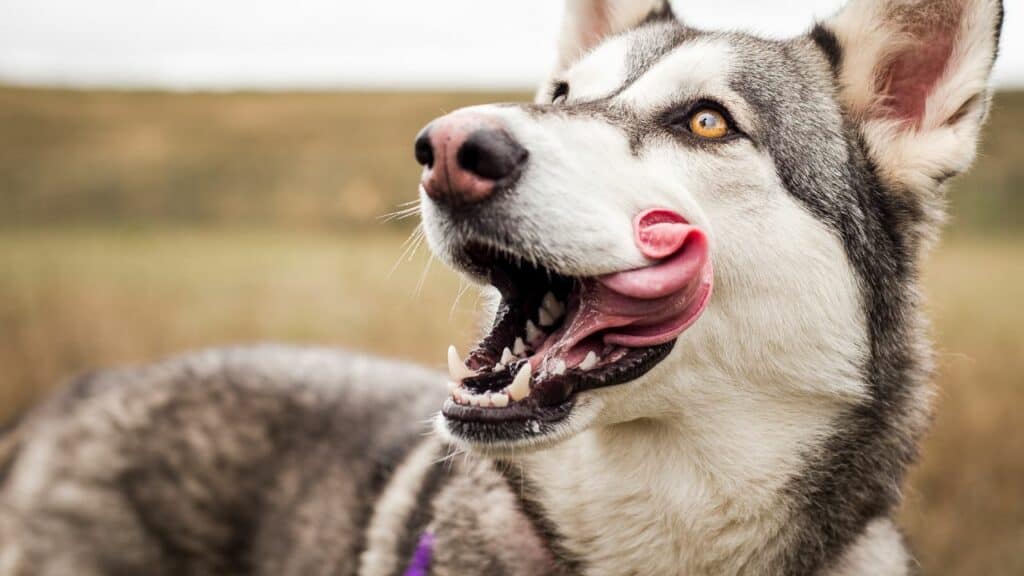
Finding out why your dog keeps licking their lips is the tricky part.
In this manner, you can determine whether it warrants worry.
Do you see your dog licking its lips before eating? Or are you cooking up something delicious on the stove?
It’s normal for your dog to lick their lips in these circumstances.
The lip licking is probably due to your dog’s fear or anxiety, perhaps during a rainstorm or when it’s close to a more giant, aggressive dog.
If possible, remove your dog from the stressful situation and seek additional advice from a dog trainer or veterinarian to lessen your pet’s anxiety.
Obsessive-compulsive disorder or a physical condition may be to blame if you cannot identify another reason for your pet’s conduct.
Dehydration, periodontitis and other dental issues, nausea, bloating, seizure disorders, and even canine cognitive dysfunction could contribute to health issues.
Call your veterinarian if you cannot determine the source of your dog’s lip-licking on your own.
As soon as you become concerned about your pet’s lip-licking behavior, it is advisable to be safe and have them inspected.
What To Do When Your Pet Keeps On Licking His Lips?
Identifying the cause of the dog’s lip-licking is the first step.
You probably don’t need to be particularly concerned about it if he is doing it out of appeasement or for a benign reason, like that his lips are dry.
However, if you think your dog is extremely fearful or worried, these negative emotions can soon turn into overt violence.
Particularly troubling is when your dog senses some threat.
You might try using a tasty treat or toy to divert your pet’s attention.
Instead, you should take action to remove your pet from the stressful situation if you recognize that something, in particular, is causing him to feel anxious or stressed, such as a person he feels uncomfortable with or a dog or animal that he does not get along with.
To prevent the situation from worsening, try to move him away from whatever makes him feel uneasy or frightened.
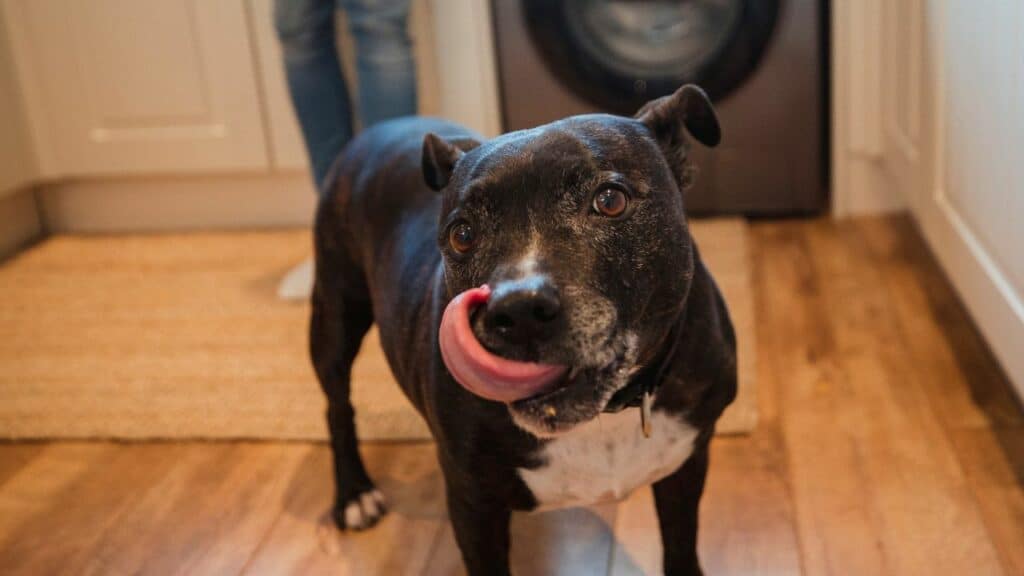
When Is Dog Lip Licking A Problem?
There are many common causes for a dog to lick its lips.
Owners of dogs ought to be aware of these. Because of this, it’s critical to pay close attention to your dog’s behavior.
Don’t wait to intervene if their lip-licking or any other habit starts to worry you.
To speak with a professional, contact your vet immediately.
Dogs that like licking and don’t cause any harm might not be an issue.
However, excessive licking that harms others or seems uncontrollable, such as that caused by a seizure disorder, is a problem.
Here are a few issues that may arise from or be caused by excessive licking.
Wound Problems
A dog might naturally want to keep an injury clean if it is infected and itchy.
A little bit is acceptable, but overdoing it can stop wounds from healing.
Some dogs will lick out the sutures used to treat an injury.
Excessive lip licking can be brought on by facial and mouth wounds.
Lick Granuloma From Excessive Licking
Some dogs can cause an injury by repeatedly licking the same area.
They frequently produce a lesion known as an “acral lick dermatitis” or a “lick granuloma.”
The cause of this compulsive, repetitive behavior could be boredom or anxiety.
Some dogs find comfort in being licked, similarly to how a child finds comfort in sucking their thumb.
The front legs are where lick granulomas typically develop.
Some dogs will spend hours still licking the same spot on their legs.
Uncontrollable Lip Licking
Some dogs may experience a seizure disorder that manifests as excessive and uncontrollable lip licking, air biting, or mouth chomping.
Most frequently, this is a “focal seizure.”
Oral Problems
Dehydrated or nauseated dogs may lick their lips excessively.
Lip licking can also be a symptom of medical conditions like dental disease, oral infections, mouth trauma, or having something stuck in their mouth (like a stick or bone).
Dogs who lick floors with cleaning agents or soap may find the taste odd and lick their lips.
Related: Why Do Dogs Eat Sticks?
When Do You Need To Visit Your Vet?
Tell your veterinarian if you believe your dog may have consumed something toxic, such as if he is vomiting or eating grass.
Some toxic substances, like caustics, may do more harm than good when vomited.
A pup that licks its lips exhibits extreme discomfort and does not appear to be getting better needs to be seen by a veterinarian immediately, especially if it does so for no apparent reason.
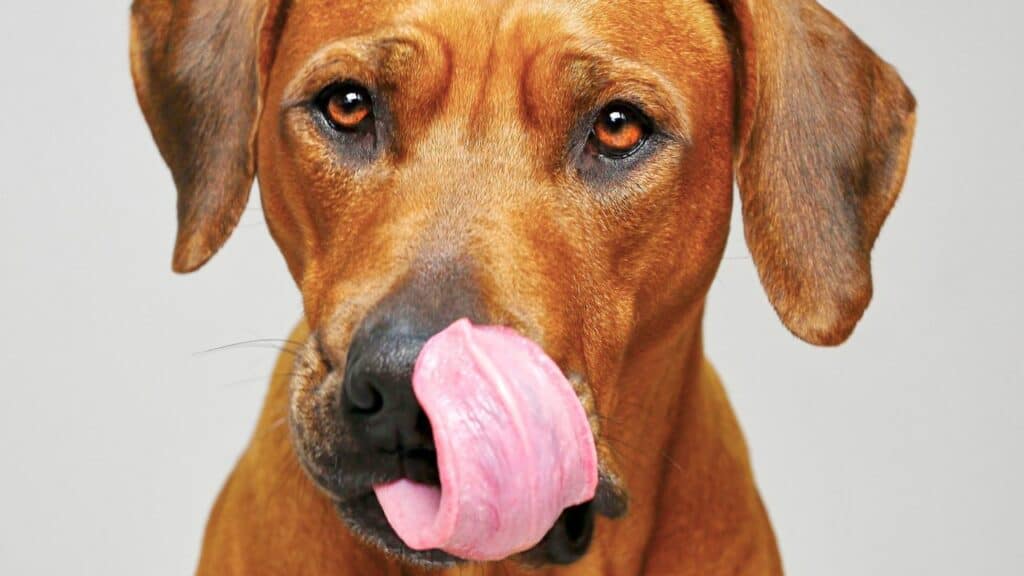
Before You Go…
Now you know why your dog does keep licking his lips.
If you want to learn more, read the following articles too!
Or watch this video:

